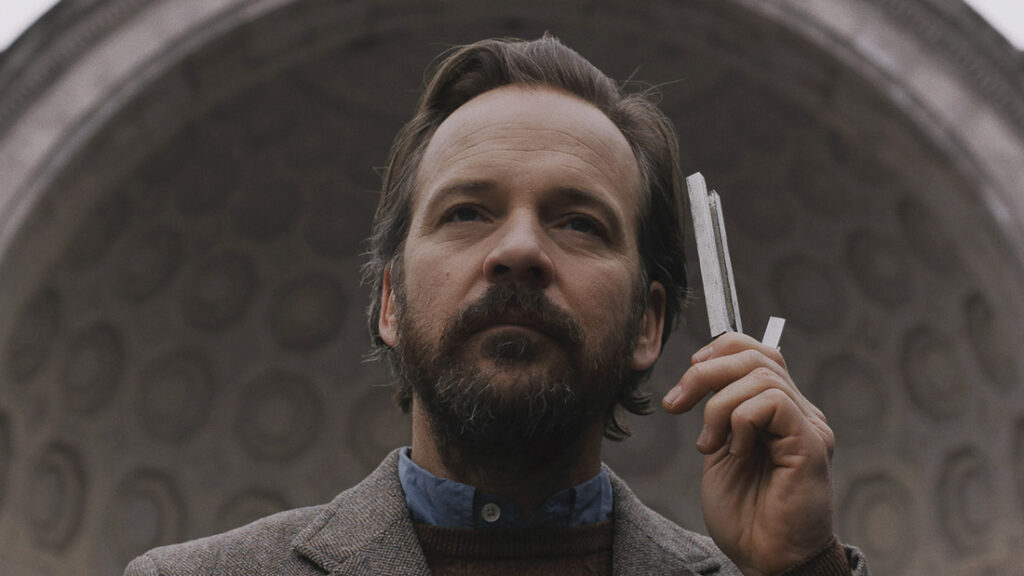The Sundance 2019 U.S. Dramatic Competition program continued to unfold on Saturday in Park City, bringing with it the premieres of several of this year’s most highly anticipated dramas. What’s been impressive to see this year has been the incredible diversity of tone, topic, and filmmakers in the program, even if it feels we have yet to see its true breakout. And yet two films premiered on Saturday that share a common thread of how much people need structure and order in their lives, and how that can create drama when it’s fractured.
The better of the two is Michael Tyburski’s “The Sound of Silence,” a movie about the imperceptible impact of the noise that surrounds most of our lives. The film take place in New York City, a place that is literally never quiet, but the concept of noise impacting mood is something that fits anywhere in the world. It doesn’t have to be the din of Times Square—it could be the hum of your refrigerator and the way it blends sonically with the din of your radiator. As someone long-fascinated with the concept of noise pollution and how the imperceptible elements of our environment can impact our lives, “The Sound of Silence” really intrigued me, and there are clearly some fascinating ideas embedded in it, but the whole production is too numbingly flat, blending into one disappointing tone. Sorry to do this, but it’s one-note.
Peter Sarsgaard stars as Peter Lucien, a “house tuner.” Feeling depressed? Maybe it’s the dissonant notes of your environment. He has many satisfied clients, and he’s used his unique job to map the tones of Manhattan. Downtown has a frenetic note; Central Park has what he calls a nostalgic one. Of course, a lot of people don’t take Peter seriously, even his peers, and then a new client named Ellen (played by Rashida Jones) seems to be a case he can’t solve, even challenging the concept that he can define human behavior by external impacts upon it.
Sarsgaard and Jones are good, but “The Sound of Silence” is uniformly drab. Even the color palette is pure browns and dark blues. It’s a tweed movie. And the relentlessly subdued tone of the film, clearly designed to mirror the always-concentrating viewpoint of the protagonist, makes for a film that sometimes feels like a dirge. Peter’s work IS fascinating, but it feels like the movie is as unsure what to make of him as the people who question his work. It’s nice when “The Sound of Silence” starts to push back against how Peter’s assumptions work from a viewpoint of human behavior that limits choice, but that comes too late in the movie. By then, too much has blended into white noise. Or tweed noise, if you will.

Sadly, “Imaginary Order” is the least effective Sundance Comp film of 2019 that I’ve seen so far this year. Wallowing morosely in too-familiar territory of suburban ennui, it wastes an opportunity to say something new about what it’s like to be a dissatisfied suburban mom near the end of the ‘10s, producing instead a flat dramedy that mismanages tone and over-directs its leading lady. Wendi McClendon-Covey completely plays against the type of role we expect from here from things like “Reno 911!” and her stellar work on “The Goldbergs,” but she can’t find the anchor to the character, leaving the whole project drifting aimlessly.
McClendon-Covey plays Cathy, a seemingly ordinary housewife in one of those phases in life in which it feels like her carefully-controlled existence is slowly getting out of her well-manicured grip. She worries that her husband (Steve Little) is having an affair and that she’s losing touch with her 13-year-old daughter (Kate Alberts). When she goes to cat-sit for her sister (Catherine Curtin), she meets her sister’s neighbors, including an outspoken mother named Gemma Jean (Christine Woods) and sullen teenage son Xander (Max Burkholder). Cathy becomes fascinated by Gemma Jean and Xander becomes fascinated by Cathy.
The concept that meeting people who are incredibly different from us can open new pathways in our personalities is one that literature and cinema have been exploring for generations, but this kind of deft character study requires a great deal of understanding of human behavior and compassion. There’s an ennui in Cathy’s life that’s too often reflected in “Imaginary Order” itself, a film that feels like it’s going through the motions as much as its put-upon protagonist. And it’s one of those movies in which events happen and decisions are made because a screenwriter wanted them to and not from anything borne organically out of the people we’re watching or the countless families like them all across suburban America.












